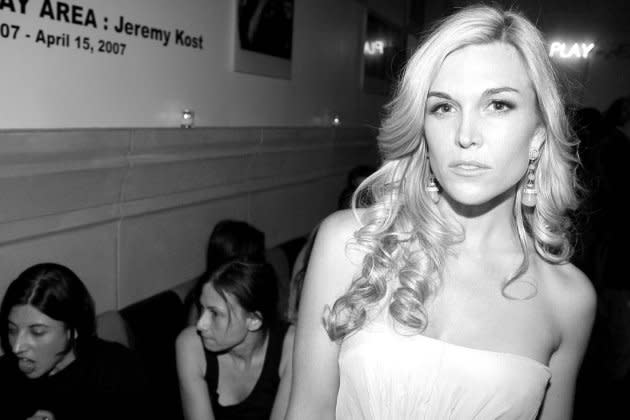The Secret Life of Paris Hilton and Tinsley Mortimer’s Gossip Blogger
- Oops!Something went wrong.Please try again later.
- Oops!Something went wrong.Please try again later.
- Oops!Something went wrong.Please try again later.

The first half of the Hulu documentary Queenmaker: The Making of an It Girl is a passable overview of the turn-of-the-21st-century heiress-celebrity scene, plus some of the bloggers who made their names as barnacles on the gilded ship. You probably know most of the boldfaced names: Paris and Nicky Hilton, Nicole Richie, Tinsley Mortimer. You might even know their most fervent chroniclers, including Perez Hilton and Gawker’s Emily Gould, professional gossips who made a meal ticket out of the usually blond, always-rich pretty young things they covered. It’s an intriguing enough story, if you enjoy the sight of a snake eating its own gold-plated tail. The celebutantes went to the right parties, mastered the art of smiling for the camera, and became perfect emblems of an era defined by being famous for being famous.
Then a different kind of character enters the picture, with a far more interesting story, and if you don’t know this part, and you actually plan on watching, you might want to stop reading now. James Kurisunkal was a pudgy, lonely, Midwestern teen, ostracized by his brown skin — his parents are Indian immigrants — and his homosexuality. He found a distant life raft of sorts, and a source of obsession, in the New York party scene and its high-profile avatars. He was particularly enchanted with Mortimer, the smiling, blue-blood Virginian who would go on to become a reality-TV character in the disastrous High Society and, more recently, The Real Housewives of New York.
More from Rolling Stone
Netflix's Anna Nicole Smith Doc Casts Her As a Cunning Fame Seeker
The Beef Gets a 'Face Lift' and New 'Chaos Menu' in 'The Bear' Season 2 Trailer
Justin Bieber's Disgraced Pastor Carl Lentz Breaks His Silence
So, he did what the kids were doing back then. He started a blog, Park Avenue Peerage, which was known for being a little kinder and gentler than the competition (not that being kinder and gentler than Perez Hilton was terribly difficult). It was popular, and the revelation of its creator’s true identity generated an ironic buzz. New York magazine hired him as a paid intern. Now he could get up close and personal with the world he had loved from afar. That world, never very friendly to outsiders, promptly chewed him up and spit him out back to the University of Illinois, where he descended into drug addiction and deep depression. “I’m no longer fascinated by this world,” he wrote in a final blog post. “I’m not impressed. In fact, I’m depressed.”
The End? Not even close. Queenmaker reveals, artfully, tastefully, and for the first time, that Kurisunkal is now Morgan Olivia Rose, a Chicago woman who has been making ends meet primarily as a sex worker. The director, Zackary Drucker, also a trans woman, enters the picture as well, offering Rose support as she shapes her story. Drucker puts Rose back in touch with Mortimer, to whom she hasn’t spoken since she was a much, much different person. Through all of this, the film transforms from being an adequate account of a time and a scene to a sort of living thing, a little messy and disjointed, but also spontaneous and unpredictable, and perhaps even authentic. Rose’s story and its past connection to the celebrity world of status and image open up a world of ideas regarding identity — its symbolism, its fluidity, and its very meaning.
Rose, glammed up in leopard print, flowing black hair and tiara, is very much a work in progress. What she makes clear is that, for the first time in her life, she feels real, and very ambivalent about her former life. When she reconnects with Mortimer, who comes across as a perfectly decent, even thoughtful and self-aware person, she clearly doesn’t know what to think or feel. This woman was once her obsession. Now, Mortimer is … what, exactly? An old friend? A ghost from another life? A painful reminder? Drucker lets the questions hang there, often wordlessly, respecting and reflecting the mystery.
Queenmaker is essentially two movies, one a critical assessment of a time and place, the other a portrait of a person who emerged from its absurdity by becoming someone else. The two parts don’t merge entirely, but this might be the point. Morgan Olivia Rose is not Kurisunkal, any more than the tabloid character named Paris Hilton, played by Paris Hilton, was really Paris Hilton. The process can be arduous, but we become, to the best of our ability, the person we want to be. One could easily argue that Rose’s example is far more genuine than the people she once turned into her reason for being.
Best of Rolling Stone
